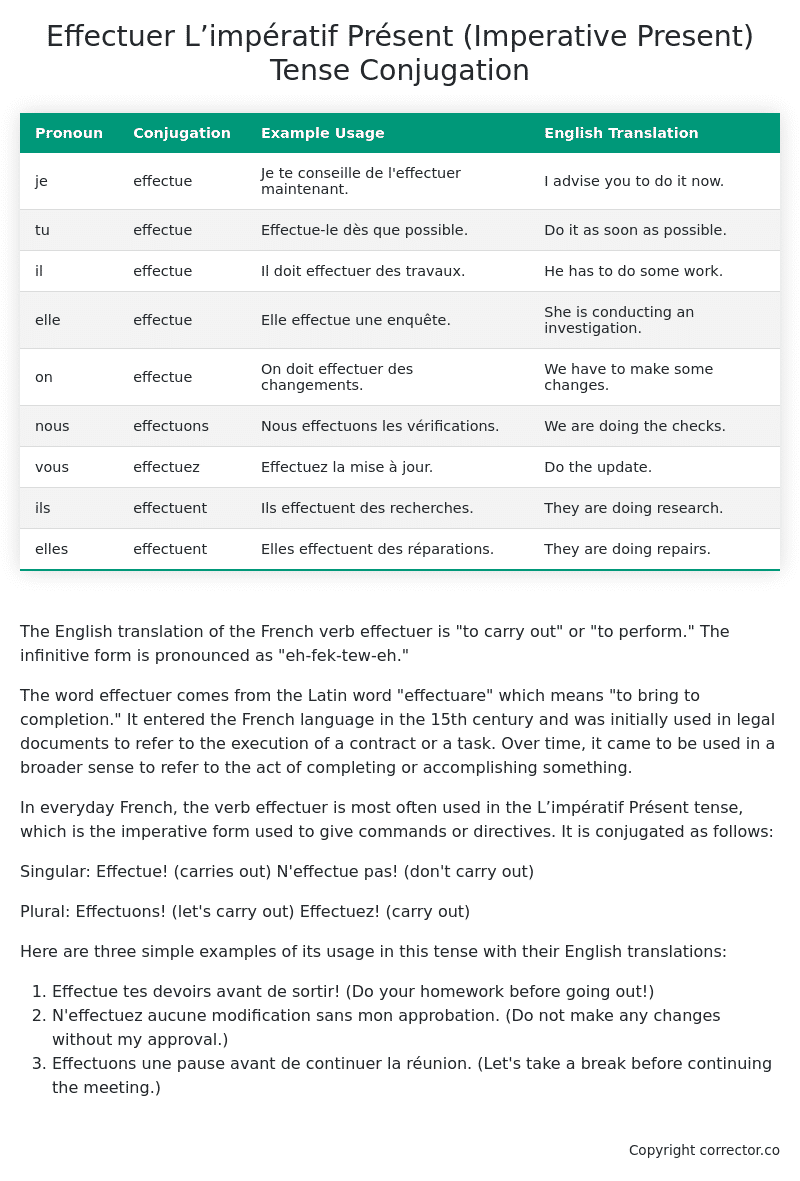L’impératif Présent (Imperative Present) Tense Conjugation of the French Verb effectuer
Introduction to the verb effectuer
The English translation of the French verb effectuer is “to carry out” or “to perform.” The infinitive form is pronounced as “eh-fek-tew-eh.”
The word effectuer comes from the Latin word “effectuare” which means “to bring to completion.” It entered the French language in the 15th century and was initially used in legal documents to refer to the execution of a contract or a task. Over time, it came to be used in a broader sense to refer to the act of completing or accomplishing something.
In everyday French, the verb effectuer is most often used in the L’impératif Présent tense, which is the imperative form used to give commands or directives. It is conjugated as follows:
Singular:
Effectue! (carries out)
N’effectue pas! (don’t carry out)
Plural:
Effectuons! (let’s carry out)
Effectuez! (carry out)
Here are three simple examples of its usage in this tense with their English translations:
- Effectue tes devoirs avant de sortir! (Do your homework before going out!)
- N’effectuez aucune modification sans mon approbation. (Do not make any changes without my approval.)
- Effectuons une pause avant de continuer la réunion. (Let’s take a break before continuing the meeting.)
Table of the L’impératif Présent (Imperative Present) Tense Conjugation of effectuer
| Pronoun | Conjugation | Example Usage | English Translation |
|---|---|---|---|
| je | effectue | Je te conseille de l’effectuer maintenant. | I advise you to do it now. |
| tu | effectue | Effectue-le dès que possible. | Do it as soon as possible. |
| il | effectue | Il doit effectuer des travaux. | He has to do some work. |
| elle | effectue | Elle effectue une enquête. | She is conducting an investigation. |
| on | effectue | On doit effectuer des changements. | We have to make some changes. |
| nous | effectuons | Nous effectuons les vérifications. | We are doing the checks. |
| vous | effectuez | Effectuez la mise à jour. | Do the update. |
| ils | effectuent | Ils effectuent des recherches. | They are doing research. |
| elles | effectuent | Elles effectuent des réparations. | They are doing repairs. |
Other Conjugations for Effectuer.
Le Present (Present Tense) Conjugation of the French Verb effectuer
Imparfait (Imperfect) Tense Conjugation of the French Verb effectuer
Passé Simple (Simple Past) Tense Conjugation of the French Verb effectuer
Passé Composé (Present Perfect) Tense Conjugation of the French Verb effectuer
Futur Simple (Simple Future) Tense Conjugation of the French Verb effectuer
Futur Proche (Near Future) Tense Conjugation of the French Verb effectuer
Plus-que-parfait (Pluperfect) Tense Conjugation of the French Verb effectuer
Passé Antérieur (Past Anterior) Tense Conjugation of the French Verb effectuer
Futur Antérieur (Future Anterior) Tense Conjugation of the French Verb effectuer
Subjonctif Présent (Subjunctive Present) Tense Conjugation of the French Verb effectuer
Subjonctif Passé (Subjunctive Past) Tense Conjugation of the French Verb effectuer
Subjonctif Imparfait (Subjunctive Imperfect) Tense Conjugation of the French Verb effectuer
Subjonctif Plus-que-parfait (Subjunctive Pluperfect) Tense Conjugation of the French Verb effectuer
Conditionnel Présent (Conditional Present) Tense Conjugation of the French Verb effectuer
Conditionnel Passé (Conditional Past) Tense Conjugation of the French Verb effectuer
L’impératif Présent (Imperative Present) Tense Conjugation of the French Verb effectuer (this article)
L’infinitif Présent (Infinitive Present) Tense Conjugation of the French Verb effectuer
Struggling with French verbs or the language in general? Why not use our free French Grammar Checker – no registration required!
Get a FREE Download Study Sheet of this Conjugation 🔥
Simply right click the image below, click “save image” and get your free reference for the effectuer L’impératif Présent tense conjugation!

Effectuer – About the French L’impératif Présent (Imperative Present) Tense
Usage
Giving commands
Making requests
Offering advice
Expressing desires
Conjugation Formation
Interactions with other tenses
Want More?
I hope you enjoyed this article on the verb effectuer. Still in a learning mood? Check out another TOTALLY random French verb conjugation!


